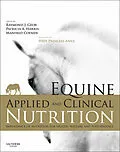Equine Applied and Clinical Nutrition is a comprehensive text resource on the nutrition and feeding management of horses. Over 20 experts from around the world share their wisdom on a topic of central relevance to all equine practitioners and the equine community generally. Both basic and applied (including healthy and diseased animals) nutrition and feeding management of horses and other equids (i.e. ponies, donkeys, wild equids) are covered. The book will appeal to a wide audienc: undergraduate and post-graduate students in equine science and veterinary medicine, veterinarians, equine nutritionists, horse trainers and owners. The clinical component will strengthen the appeal for equine veterinarians. Equine Applied and Clinical Nutrition will be a "must have" for anyone involved in the care of horses, ponies and other equids.
The book is divided into 3 parts:
- Basic or core nutrition in this context refers to digestive physiology of the horse and the principles of nutrition.
- Applied nutrition deals with the particular types of foods, and how to maintain an optimum diet through various life stages of the horse. You might characterize this aspect as prevention of disease through diet.
- Clinical nutrition covers various diseases induced by poor diet, and their dietary treatment and management. It also looks at specific feeding regimes useful in cases disease not specifically induced by diet.
- Authoritative, international contributions
- Strong coverage of clinical aspects either omitted from or only sparsely dealt with elsewhere
- Full colour throughout
- The only clinical equine nutrition book
Inhalt
SECTION 1: CORE NUTRITION
Digestive physiology
Metabolic physiology
Feeding behaviour
Research techniques in equine nutrition
Energy
Amino acids and protein
Fats and fatty acids
Carbohydrates
Vitamins
Minerals
Water
SECTION 2: APPLIED NUTRITION AND FEEDING MANAGEMENT
A. General considerations
Feedstuffs for horses
Pastures and pasture management
Supplements and nutraceuticals (including ergogenics)
Ration evaluation and formulation (with discussion on feed manufacturing practices)
International feeding practices
B. Feeding through the lifestages
Broodmare and stallion
Growing animals
Mature horses
Old horses
Athletic horses (possibly several chapters under this heading - a basic core chapter, then a group of small chapters that deals with different disciplines e.g. racehorses, endurance, 3-day event)
C. Special considerations
Ponies, donkeys, miniature horses
Wild equids
Orphan foals
.
SECTION 3: CLINICAL NUTRITION
Clinical assessment of nutritional status
Muscle disorders
Laminitis
Obesity
Thin and starved horses
Endocrine diseases (equine metabolic syndrome; equine Cushing's disease)
Developmental orthopaedic disease
Osteoarthritis
Gastrointestinal diseases (gastric ulcers, colic, diarrhea)
Allergic and inflammatory airway diseases
Renal and hepatic
Skin diseases/atopy
Central nervous system diseases (e.g. equine motor neuron disease; grass sickness)
Behavioural abnormalities (stereotypies)
Assisted enteral and parenteral feeding
Feed-related toxicities
APPENDICES
Nutrient requirements
Nutrient composition of feeds
Reference ranges for blood metabolites, minerals and vitamins
Milk composition
